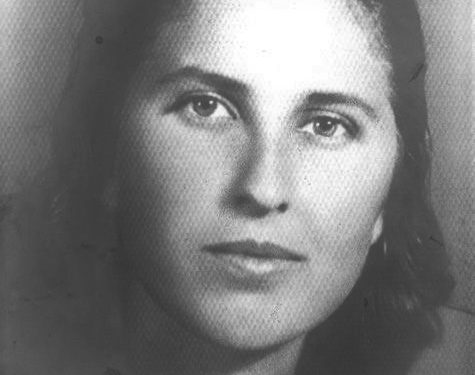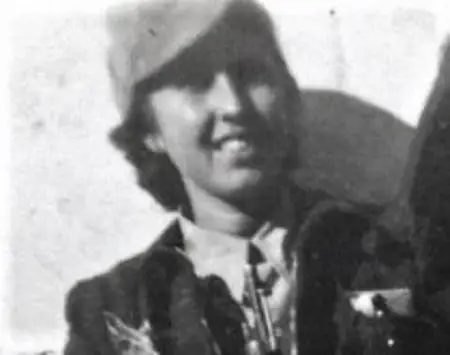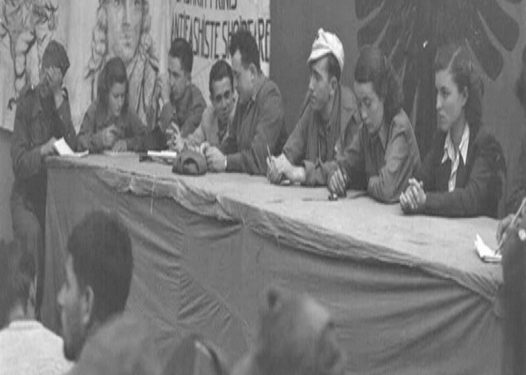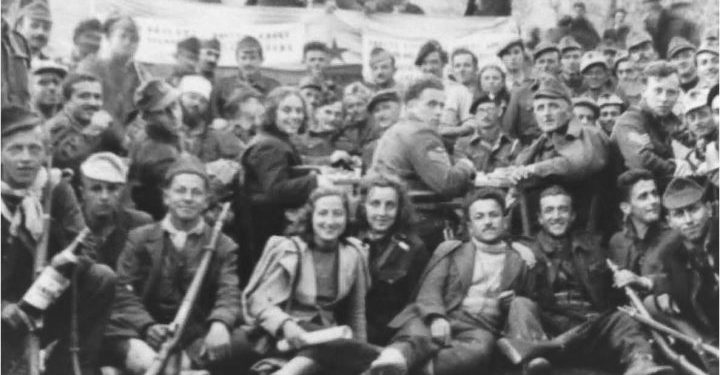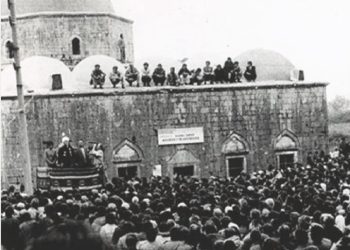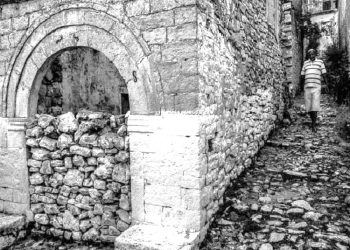By Edmond the Priest
The confession of the former partisans of the 5th Assault Brigade, witnesses of the event about the mystery of the execution of the partisan Ramize Gjebrea and the murderous accusations of the 21-year-old’s “love” with Zaho Koka…!
Memorie.al / “That year, spring also came cold. It was March 5, 1944. That day only the two leaders were missing; The commander of the 5th Brigade, Shefqet Peçi, and the Commissioner, Hysni Kapo, while the murder was being organized for the accusation of disloyalty, in the partisan headquarters…”?! – says former partisan of the 5th Assault Brigade, Mato Hasamataj. The 21-year-old, the youth leader of the 5th Assault Brigade, Ramize Gjebrea, was shot on March 5, 1944, without any evidence, but with an order from above, which was never known who signed it. One of the shameful stains of the ALP, which even today, after almost 80 years, does not have the courage to show remorse.
The truths of this murder are in the grave, but no attempt has been made to find the perpetrators of this execution even though, a year later, the trial of the Supreme Court took place.
Ramizeja was accused of being the secret girlfriend of the battalion commander of the 5th Brigade, Zaho Koka, while she was officially the fiancee of Nako Spiru. This unforgivable mistake, (secret love) for the “Party” and Ramize Gjebrea, according to them, deserved the execution of the traitor behind his back…!
But why not, the causes of this execution were related to the personal struggle for career, which had erupted feverishly in those years.
With this accusation, i.e. “immorality”, the court of the Fifth Brigade sentences Ramizena by firing squad.
Ramizea, would still be alive, if the courier’s letter, sent by the General Staff of the Army, would arrive three hours earlier in Ramica of Vlora, which opposed the decision of the Court of the 5th Brigade, for its execution.
But it was too late; Ramize’s life did not come back even though the right to live was also given by the General Staff of the Army…!
Execution!
Beyond the mountains, in the lonely Ramica, near Vlora, they treacherously killed the 21-year-old girl, Ramize Gjebrea, a partisan from Gjirokastria. From the memories of that time, Mato Hasemataj, a former partisan in the 5th Brigade, wrote in his memoirs, sometime at the beginning of the years of democracy: “…That early March morning, with clouds as if flying, the buds opened on the shingle, the almond and the hazel, Mesaplik’s light and whiteness shone… don’t blame yourself for loving life and not being able to swallow a lie. Your two eyes that strongly loved everything beautiful, true. And that I will not be able to forget them, as long as I have breath and life”!
After the execution behind the back, by the Court of the 5th Brigade, the Supreme Court, in 1945, conducted a formal trial, where it was investigated about the innocence or not, of her guilt, but not about the real culprits of the crime. While the trial took place behind closed doors, for the public, Nako Spiru – her fiance – supported her figure throughout.
According to the latest archival data, it was Dushan Mugosha (Dusan Mugosa), the delegate of the Yugoslav Communist Party (at that time he helped the partisans, in Ramica of Vlora) together with other members of the Court of the 5th Assault Brigade, they, who gave the order for the execution of Ramize Gjebre.
The latter was taught by Nijaz Dizdarević, the Yugoslav consultant helping Albanian youth during the war, who in 1988 published a book in the Serbo-Croatian language, entitled “Albanski Dnevnik” (“Globus” Typography, in Zagreb, Croatia).
“Ramize Gjebrea was not killed without the knowledge of Dushan Mugosha”!
Although Ramize Gjebrea was shot, the fact remains a mystery, how the Brigade Court managed to execute one of its members, when it is known that the orders for executions came only from the General Staff of the Army – says Ali Gjebrea, a close member of the family Ramise.
According to him, this execution had nothing to do with a love story, but with the elimination of people who tomorrow (after the war) could have a future in power. Likewise, Aliu says that Nako Spiro has expressed that: even if this story of her love with Zaho Koka was true, this was his personal issue and not the Party’s. He kept this opinion until the end of his life, always expressing himself with consideration for his fiancee.
Fake trial…!
A year after the murder, the trial on the murder of Ramize Gjebre takes place, which took into consideration only the fact whether or not Ramize had a relationship with Zaho Koka. At the end of this investigation, the Supreme Court, chaired by Frederik Nosin, declares Ramize Gjebrena innocent, giving her the title: “Witness of the Nation”.
Furthermore, this court did not consider who the perpetrators of the murder were or who ordered the execution of Ramize, but simply considered the story of her love with Zaho Koka as a rumor woven in the name of power.
The truth of that day’s crime finally sank in, where Ramize Gjebre’s remains rest, near the “Mother Albania” monument, since her exhumation from the shooting site in May 1945!
Berata girl with Kaçanik blood
Ramize Gjebrea was born in the city of Berat on April 20, 1923, in a family with patriotic traditions. His mother, Safia, was from Kaçanik, Kosovo. Meanwhile, during the War with the Turkish yoke, she met Rustem Gjebrena, whom she soon married. Ramizeja, since childhood, was inspired by the origin of her family, and turned into an ardent patriot for the pan-Albanian cause. As if imagining the fate of Albania after the war, she addressed Agllai Zoto, – the woman’s activist on the Coast, – on 29.08.1943, with the words: “…we are for the National Liberation War and not to bring the Russians or the Greeks with serbian here…”!
Ramizeja, the bride who passed the siege
The girl from Berata, who managed to become famous with her intellect, was ranked among the first female “rebels” of the “Queen Mother” Women’s Institute in Tirana. In the years 1935-1941, she was noted for her school preparation, literary and organizing tendencies, becoming the leader of demonstrations, anti-fascist activities and distribution of patriotic songs.
The career as a high school student was closed due to her pro-Albanian beliefs, being recorded in history as the first Albanian woman, who was put in charge of the demonstration on October 28, 1941, when she knocked the fascist officer of the Carabinieri from his horse, who tried to tear the Albanian flag. Vera Malo, a former colleague of the Women’s Institute, says about her that: “she read a lot, especially forbidden books, which she wanted to discuss with honor – until one day – a call from young people came into her hands of the Pedagogical Council, and expelled him for seven days”.
For her and her friends, it was time to go underground. Since 1942, she works in secret, – she is arrested, and due to lack of evidence she is released after four days, – connecting with Shejnaze Juka in Shkodër, (there is an article written by Taras Begeja, in the National Historical Museum) and in March of the same year, cooperates with Qemal Stafa, in the district of Gjirokastra.
He returned to Tirana in 1943, where he was appointed in charge of the youth of Berat and convened the Youth Conference of Albania in Zaloshnje (Skrapar). Together with Mihal Durin and Misto Mamen, she organizes the kidnapping of the “Gutenberg” printing press, as well as the crossing of the enemy checkpoint, disguised as a bride. He works in Elbasan, Sulovë, Mallakastër, Lubonjë, Treblovë, Kuç and finally in Ramicë of Vlora.
Memories, just memories…the culprits…?!
The veteran of the 5th Assault Brigade, Andon Cane Xhaka from Vlora, says that after the first bullet that didn’t hit him, the surprised Ramizeja said: “Wow, what happened?”. But premeditated and criminal, this shooting was carried out. Many comments have been made about this act and about the real culprits…! The truth is that Ramizeja became a victim of ignorance and communist inquisition.
The writer Shefqet Musaraj, in the Magazine “Shxiptarja e Re” (No. 11, year 1973), among others, wrote: “…Of the women who made a very valuable contribution during the War, Ramize Gjebrea was… “!
Liri Belishova once again recalled two moments that have remained in her memory: “The first, when we sang in the choir at the Institute the song, ‘Enough in captivity, Kosovo and Chameri…’, and secondly, the kidnapping action of “Gutenberg” printing house, where the dictator Enver Hoxha did not mention its name at all. Liria then tells about the beautiful and clever Ramizena, and why she was chosen by Nako Spiru to marry her.
“The dead live with us, they are only physically not with us”, – remembers Liria, Viktor Hygo’s statement, adding that: “This is very true, as we have constantly felt him near… as he spoke in January 20, 1944, at the establishment of the 5th Assault Brigade, in front of more than 3,000 partisans, in the Bramyshnje valley, saying: ‘…revenge for every inch of land trampled by the enemy, revenge for the blood of comrades! The enemy will pay for every drop of blood with a soldier’s head…”, she had said in those winter days…!
Veteran of the 5th Brigade, Lefter Kasneci
“I met Ramizena in December 1941, when she was working illegally. She was a smart girl. He was fluent in Italian, French and Turkish (which his mother had taught him). It was interesting, as she had the nickname, as it was seen during her speech in front of the Brigade, with 3000 partisans”.
Requiem
One thing seems to have aroused jealousy and enmity against Ramize. According to the facts, she was of anti-Yugoslav persuasion, which made her disagree with Enver Hoxha’s breaking of the ‘Mukje Agreement’ – saying (August 1943): “Now a great fratricide will begin, between the Albanians and the Yugoslavs, you will have fun…!
This is how Ramizeja expressed herself after the Mukje Conference, openly stating her disagreement with the further course of the Kosovo issue.
The accusation of tarnishing her morals was not true, which was also rejected by the Supreme Court in 1945. According to the veteran, Xhaka, “the communist inquisitors regretted killing her, after a few hours shooting, the cancellation order had come, but it was too late…”!
Ramize Gjebrea, did not agree with the treatment of the Albanian Communist Party and its pro-Slavic leadership, the issue of Kosovo – the history and tragedy of its fragmentation, which she knew quite well – as she was the granddaughter of Kaçanik of Kosovo.
Maybe luck was not with him! The various accusations thrown at her, which then led to the shooting, did not have the same fate for Zaho Koka.
He was declared “Hero of the People”, falling in battle against the Germans in Vuno of Himara, on 08.06.1944.
While Ramize Gjebre’s fiance, Nako Spiru, years later, after her execution, married Liri Belishova. He was considered an agent of conspiracies by Tito’s emissaries in Albania, on the eve of the Second Plenum of the Central Committee of the Albanian Communist Party, in Berat”.
He killed himself in 1947.
It is said that some of the films of the former Kinostudio “New Albania”, such as “The Bride and curfew” and “Girls with red ribbons”, took the subject of their script from the work of Ramize Gjebre. Memorie.al
(Note: The documents were used from the personal archives of the Gjebrea tribe. Original manuscripts, commentaries, interviews, publications, decorations and photographs).




